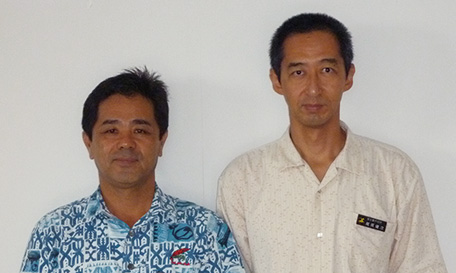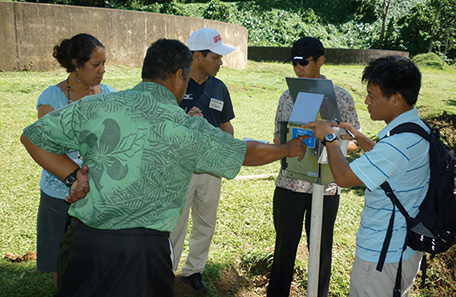Japan's Official Development Assistance White Paper 2012
Stories from the field 5
From Our Island to Yours: Clean Water Technology
– Miyakojima City Supports Samoa Public Waterworks –

Mr. Uechi (left) and Mr. Kajiwara, inseparable as they work on this project (Photo: Miyakojima City)
The South Pacific island nation of Samoa frequently experiences water outages, turbidity during rainy seasons and a host of other water supply problems. Events in 2000 eventually led the Miyakojima City Water Authority (MCWA) to administer assistance to Samoa through JICA.
In 2000, Shinshu University Professor Emeritus Nobutada Nakamoto helped the Miyakojima Waterworks Group (MWG), as MCWA was called then, improve ecological water purification system using algae and other microbes. This system does not require the use of chemicals, enabling MWG to provide a water supply at a low cost. The Group wanted to make a contribution to the world by sharing this ecological water purification system and made a proposal to JICA.
Waterworks technicians from Samoa and other Asian and Pacific Island nations were invited to train in Miyakojima under JICA Partnership Program from FY2006 to FY2008, and the program selected Samoa as its focus from FY2010 to FY2012. Samoa was chosen because the high biological activity in its tropical marine climate is ideal for ecological water purification system, because facilities for ecological water purification had already been built there, and because the Samoa Water Authority (SWA) wanted to improve the operational systems of its purification plants. The Miyakojima's Water Supply Model Project in Samoa, JICA Partnership Program began in April 2010.
Akito Uechi is an expert with 25 years' experience in waterworks operations, and he has been involved in this grassroots program since its beginning in 2006. He noticed something when he spoke with workers at SWA. "They said they wanted us to help them develop water sources because they did not have enough water during the dry seasons," Mr. Uechi said. "But when I prodded further, I found that 60% of water leaving the purification plants was being lost to leakage. If we could just fix the leaks, they would be able to secure adequate water supplies for their areas."

Checking the instruments that measure water volume in pipes at the Alaoa Treatment Plant (Photo: JICA)
In those days, it was common to see water overflowing in the streets and passages in Apia, the central city of Samoa. Leaks from water pipes were repaired quickly in Japan, but they were frequently left alone in Apia. Mr. Uechi put effort into improving leak detection skills among local waterworks personnel and taught them to repair simple leaks on the spot as soon as they were discovered. The result was a massive decrease in the amount of water spilling out above ground. "An integrating force is required to manage waterworks as a whole, from the source to the tap," Mr. Uechi said. "That is why it is important to give technical instruction in line with the recipient country's needs and characteristics, much as we might like to cram a lot of content into the training. We also focused our curriculum on practical training rather than lecturing. Aid can’t be pushy."
When the cooperation in Samoa began in 2010, Mr. Uechi appointed Kenji Kajiwara from the Miyakojima Planning Policy Department to coordinate the project. Mr. Kajiwara was not a waterworks technician, but he was qualified to coordinate with Samoa and integrate Mr. Uechi's technical guidance policies in a targeted manner. From that point on, Mr. Uechi the technical advisor and Mr. Kajiwara the coordinator were inseparable in their efforts to administer technical cooperation to Samoa. At first, Mr. Kajiwara did not understand how he could fulfill his core responsibilities as a public servant of Miyakojima City by working on international cooperation. "Only once I actually became involved was I able to see our current issues in Miyakojima and prospects for the future," Mr. Kajiwara recalled. "I came to believe that improving ourselves as civil servants and expanding our knowledge through international cooperation could be turned back into civil services."
Many countries have assisted Samoa in upgrading its waterworks, and water pipes built under different specifications have been forcefully connected to each other. This is a major cause for leaks. There are differences between the natural and social environments of Samoa and countries that supplied aid, meaning that the technologies introduced are not always suitable for Samoa. Mr. Kajiwara echoes Mr. Uechi in his belief in the importance of independence rooted in the local area. "I want the people of Samoa to be able to decide for themselves which technologies and methods are appropriate for their own areas," Mr. Kajiwara said. "Then, I want them to maintain and run waterworks operations independently. The risk that changes to the environment will cause water resources to become depleted or contaminated is by no means small. I think it is absolutely vital for Samoans to establish independent waterworks operations so that their descendants can continue to live in Samoa."
Mr. Uechi and Mr. Kajiwara continue to give aid with the belief that the history of waterworks in the islands of Okinawa, which have limited water resources, can help Samoa and other Pacific Island nations establish independence and that Okinawa can learn something through their aid.
